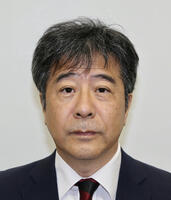Takeshi Ikenaga was born in Kitakyushu city, Japan on July 8, 1964. He received B.E. and M.E. degrees in electrical engineering from Waseda University, Tokyo, Japan, in 1988, and 1990, respectively, where he belonged to the Information Systems Laboratory directed by Professor Katsuhiko Shirai (past president of Waseda University). He also received Ph.D degree in information & computer science from Waseda university in March 2001.
He joined LSI Laboratories, Nippon Telegraph and Telephone Corporation (NTT) in 1990, where he has been undertaking research on the design and test methodologies for high-performance ASICs, a real-time MPEG2 encoder chip set, and a highly parallel LSI & system design for image-understanding processing.
From 1999 to 2000, he was a visiting researcher at the Architecture & Language Implementation (ALI) Group (directed by Professor Charles C. Weems) of the Department of Computer Science, University of Massachusetts, Amherst, USA. In 2002, he returned to Kitakyushu city and worked for the Kitakyushu Foundation for the Advancement of Industry, Science andTechnology (FAIS) as an invited researcher.
He is presently a professor in the system LSI field of the Graduate School of Information, Production and Systems, the Graduate School of Fundamental Science and Engineering, and Department of Electronic and Photonics Systems, School of Fundamental Science and Engineering (FY2006-2013), Waseda University.
His current research interests are application SoCs for image and video processing, which covers video compression (e.g. H.264/AVC, H.264/SVC, H.265/HEVC), video filter (e.g. super resolution, noise reduction), video recognition (e.g. feature point detection, object tracking) and video communication (e.g. UWB, LDPC, public key encryption). He also has interests in application-oriented many-core processor design. He is promoting many national projects, such as Program for Leading Graduate Schools, Global COE, Core Research for Evolutional Science and Technology (CREST), Special Coordination Funds for Promoting Science and Technology, Knowledge Cluster project and Grants-in-Aid for Scientific Research. He is also promoting industry academia collaborations with many companies.
Dr. Ikenaga is a senior member of the Institute of Electrical and Electronics Engineers (IEEE), a member of the Institute of Electronics, Information and Communication Engineers of Japan (IEICE), the Information Processing Society of Japan (IPSJ) and a board member of the Institute of Image Electronics Engineers of Japan (IIEEJ). He served as an associate editor and a secretary of the IEICE Transactions (incl. special sections) and a secretary of the system LSI technology commitee of the Japan Electronics and Information Technology Industries Association (JEITA). He also served as an organizing committee or a technical program committee members for many international conferences (e.g. ASP-DAC, IEEE ISCAS, IEEE MWSCAS, IEEE SiPS, ICFPT, ISPACS, ASSCC, IEEE ICME, SISA, ASICON, APSIPA ASC, VLSI-DAT and APCCAS) and a chair of Signal processing systems TC for Asia-Pacific Signal and Information Processing Association (APSIPA) .
He received the Furukawa Sansui award from Waseda University in 1988. In 1992, he also received the IEICE Research Encouragement Award for his paper ``A Test Pattern Generation for Arithmetic Execution Units''. His team also awarded at the DAC/ISSCC 2006 student design contest (Conceputual 1st place), the 8th and 9th LSI IP design award (IP prize) in 2006 and 2007, the 10th LSI IP design award (IP excellent prize) in 2008, Excellent paper award from IIEEJ in 2008, CSPA best paper, ISOCC Samsun award in 2009, ICD best poster award in 2010, IMPS best poster award in 2011, and so on.


Click to view the Scopus page. The data was downloaded from Scopus API in February 26, 2026, via http://api.elsevier.com and http://www.scopus.com .